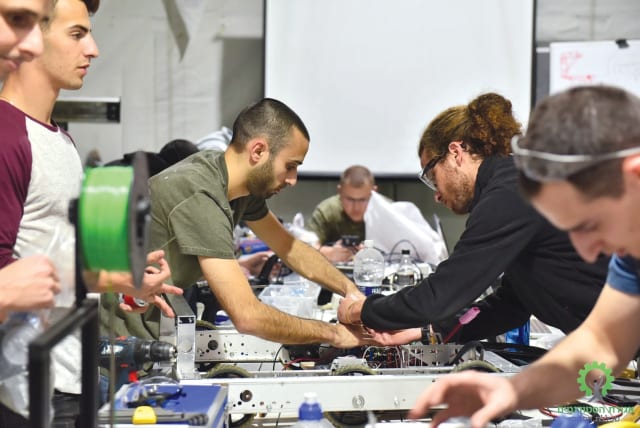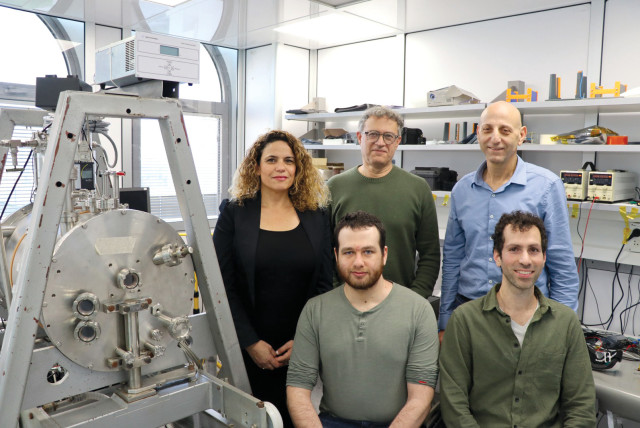Is Israel’s ‘innovation industry’ in the hands of young engineers?

Ultimately, while layoffs and inflation are painting a bleak economic picture at the moment, the sky is the limit both figuratively and literally for students who strive for a future in STEM.
By now, the issue of a talent shortage in Israel’s hi-tech scene has been well-documented.
According to the Israel Innovation Authority’s State of Hi-Tech 2022 report, the country’s tech industry is experiencing a dramatic shortage of engineers and programmers; a prior report from Israel’s State Comptroller Matanyahu Engelman found that there were 18,500 vacant positions in the hi-tech sector.
Yet Prof. Noam Eliaz, dean of the Iby and Aladar Fleischman Faculty of Engineering at Tel Aviv University is undeterred by these challenges.
Israel's hi-tech engineers will always be in high demand
“Because the industry will always look for the most talented engineers, we believe that our engineers will always be in high demand at any given economic crisis,” he said, adding that in 2022, TAU alumni ranked seventh in the world in the prestigious PitchBook ranking for entrepreneurship and was the only university outside the United States to make the Top 10.
Prof. Ami Moyal, president of Afeka – The Academic College of Engineering in Tel Aviv, believes the media is looking at this looming problem in the wrong way by defining the situation as a dilemma facing the “tech industry.”
Moyal instead focuses on what he describes as the “innovation industry.” He suggests that professionals across sectors – whether they work in medicine, government, banking, or otherwise – must possess a multidisciplinary skillset in order to drive innovation. And that is where engineering comes into the picture.
“In a long-term strategic view, the Israeli economy needs more engineers because the job market will become more and more [science, technology, engineering and math] STEM-oriented,” Moyal says.
“We will need engineers not only in the hi-tech industry but also in the classical industries that will be obliged to incorporate innovation.”
Eliaz can attest to the success found in this approach, as TAU is “the first [university] in Israel to offer multidisciplinary undergraduate programs, such as Engineering and Humanities, or Digital Sciences for Hi-tech,” he explains.
TAU students are following industry and employment trends that gravitate, at the moment, to energy, space, AI, autonomous vehicles, defense, quantum technologies, Internet of Things, additive manufacturing and bio-convergence, he adds.
In a sense, students themselves are responding to these changing times, with Engineering the most popular academic discipline among Israeli undergraduate students in recent years, according to the Council for Higher Education.
But that does not mean the workforce is necessarily receiving the kind of entry-level engineers who meet companies’ needs – and by extension, the engineers who will help Israel maintain its global status as an innovation powerhouse.
Accordingly, Afeka College has embarked on a journey of curricular transformation in which it has adapted the same engineering design methodology used in the hi-tech industry to develop products, with the aim of transforming its engineering education process. This methodology is rooted in the six main principles of engineering design: ask, imagine, plan, create, experiment, and improve.
The college surveyed 103 Israeli hi-tech companies on the skills and knowledge base that they expect from entry-level employees. The result was what the institution calls a “graduate profile,” encompassing scientific knowledge, engineering knowledge, engineering skills, personal skills, ethics, languages and broad knowledge.
“We asked ourselves: What is the graduate profile of the engineer that is graduating from Afeka, that if we would be able to measure all those skills, we would be very satisfied with the outcome,” Moyal says.
“When I entered office [as president of Afeka College],” he reflects, “I put many basic questions on the table. The first one was, do we know exactly what the hi-tech industry needs from an engineer? Secondly, are we familiar with what the new generation of students is bringing from high school and how they want to learn?”
Today’s Afeka students, he says, are a “completely different” breed from their predecessors.
“Sitting in lectures for eight hours a day doesn’t fit with them,” he says. “We needed to change pedagogy to be more project-based and hands-on and to provide a learning experience.”
Engineering education, Moyal explains, “is not like boot camp.”
“As an engineer, you acquire scientific knowledge, engineering knowledge and skills. You can develop new products. It’s a completely different education path.”
Meanwhile, TAU’s approach to changing times in the engineering industry has involved partnering with institutions around the world in order to amplify what students can achieve in an increasingly globalized workplace.
For example, the university’s collaboration with Northwestern University, in Illinnois, is “a wonderful example of a deep and multifaceted relationship that was grown for the benefit of our faculty and students at all levels,” Eliaz says.
“The workshop has proven to be one of the key success factors in the new strategic plan that we are currently developing. We are interested in developing, for example, double PhD programs, joint workshops, seed money for joint research, joint online courses, joint post-docs, students exchange, sabbaticals and so on.”
And, yet, despite these two experts’ belief in the potential of the next generation of Israeli engineers, they acknowledge that there is still room for improvement in the country’s approach to teaching STEM as a whole.
“It is not a secret that students are under-prepared for academic studies in the fields of sciences and mathematics. There is a huge shortage of mathematics teachers and natural sciences teachers in high schools. In addition, classes have too many students, which make it impossible for high-level enriching laboratories,” Eliaz says.
Moyal agrees with this assessment and advocates for a “minimum level of STEM education” for all pupils in K-12 education, and a higher level for those who wish to continue studying the STEM disciplines in higher education. With technology progressing at an exponential rate and simultaneously changing the world, Moyal believes Israel has no choice but to pursue this path.
One of the college’s recommendations for the country is forming a national STEM committee composed of government officials as well as academic and industry leaders, which would present the vision and terminology that are used surrounding STEM at all levels of the educational continuum, from kindergarten to higher education.
“If you can implement the definition of the graduate profile in high school, in primary school and even in kindergarten, you set goals for the educational process,” Moyal says.
“All of the future world will be digital, so we need to provide students with the tools to succeed in a STEM-based economy from as early as kindergarten.”
Eliaz hopes to roll up his sleeves and get involved on a personal level, saying he aspires “to lead a K-12 program in Israel which will both contribute to the STEM education in schools and help us promote outreach activities.”
In the area of new space and the successful launch of nano-satellites, he says, TAU’s Faculty of Engineering is considered the best in the world.
“We have successfully launched three nano-satellites in the last two years. Thanks to that, we recently won a tender from the Israel Science and Technology Ministry to design and construct a fleet of nanosatellites in schools on the periphery of Israel and launch it to space from Cape Canaveral.”
Ultimately, while layoffs and inflation are painting a bleak economic picture at the moment, Eliaz and Moyal agree that the sky is the limit both figuratively and literally for students who strive for a future in STEM – that is if academic institutions empower them with the tools they need to succeed in a shifting landscape.
“The whole world surrounding us, specifically industry and students, is changing,” Moyal declares, “so we must change.” ■
Jerusalem Post Store
`; document.getElementById("linkPremium").innerHTML = cont; var divWithLink = document.getElementById("premium-link"); if (divWithLink !== null && divWithLink !== 'undefined') { divWithLink.style.border = "solid 1px #cb0f3e"; divWithLink.style.textAlign = "center"; divWithLink.style.marginBottom = "15px"; divWithLink.style.marginTop = "15px"; divWithLink.style.width = "100%"; divWithLink.style.backgroundColor = "#122952"; divWithLink.style.color = "#ffffff"; divWithLink.style.lineHeight = "1.5"; } } (function (v, i) { });


